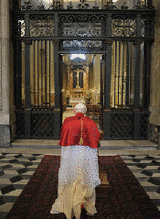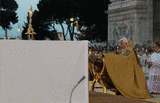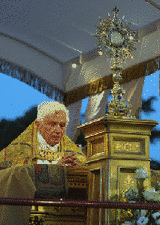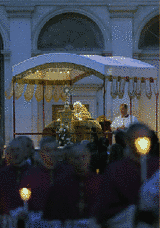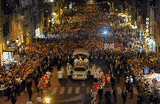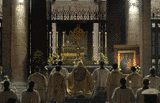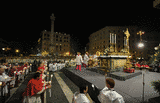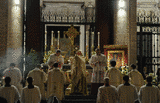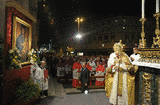Solemnity of Corpus Christi 2012
Pope Benedict XVI's Homily at Mass
Piazza outside the Basilica of St John Lateran
before Adoration of the Blessed Sacrament & a Eucharistic Procession to the Basilica of St Mary Major
Thursday, 7 June 2012 - in English, French, German, Italian, Portuguese & Spanish
"Dear Brothers and Sisters!
This evening I would like to meditate with you on two interconnected aspects of the eucharistic Mystery: the worship of the Eucharist and its sacredness. It is important to take it up again to preserve it from incomplete visions of the Mystery itself, such as those which were proposed in the recent past.
First of all, a reflection on the value of Eucharistic worship, in particular adoration of the Most Blessed Sacrament. It is the experience that we will also live after the Mass, before the procession, during its development and at its end. A unilateral interpretation of Vatican Council II has penalized this dimension, restricting the Eucharist in practice to the celebratory moment. In fact, it was very important to recognize the centrality of the celebration, in which the Lord convokes his people, gathers them around the twofold table of the Word and the Bread of life, nourishes them and unites them to Himself in the offering of the Sacrifice. This assessment of the liturgical assembly, in which the Lord works and realizes his mystery of communion, remains of course valid, but it must be placed in the right balance. In fact – as often happens – the stressing of one aspect ends up by sacrificing another. In this case, the accentuation placed on the celebration of the Eucharist has been to the detriment of adoration, as act of faith and prayer addressed to the Lord Jesus, really present in the Sacrament of the altar. This imbalance has also had repercussions on the spiritual life of the faithful. In fact, concentrating the whole relationship with the Eucharistic Jesus only at the moment of Holy Mass risks removing his presence from the rest of time and the existential space. And thus, perceived less is the sense of the constant presence of Jesus in our midst and with us, a concrete, close presence among our homes, as “beating Heart” of the city, of the country, of the territory with its various expressions and activities. The Sacrament of the Charity of Christ must permeate the whole of daily life.
In reality, it is a mistake to oppose celebration and adoration, as if they were in competition with one another. It is precisely the contrary: the worship of the Most Blessed Sacrament is as the spiritual “environment” in which the community can celebrate the Eucharist well and in truth. Only if it is preceded, accompanied and followed by this interior attitude of faith and adoration, can the liturgical action express its full meaning and value. The encounter with Jesus in the Holy Mass is truly and fully acted when the community is able to recognize that, in the Sacrament, He dwells in his house, waits for us, invites us to his table, then, after the assembly is dismissed, stays with us, with his discreet and silent presence, and accompanies us with his intercession, continuing to gather our spiritual sacrifices and offering them to the Father.
In this connection, I am pleased to stress the experience we will also live together this evening. At the moment of adoration, we are all on the same plane, kneeling before the Sacrament of Love. The common and ministerial priesthoods are united in Eucharistic worship. It is a very beautiful and significant experience, which we have experienced several times in St Peter’s Basilica, and also in the unforgettable vigils with young people – I recall, for example, those of Cologne, London, Zagreb, Madrid. It is evident to all that these moments of Eucharistic vigil prepare the celebration of the Holy Mass, prepare hearts for the encounter, so that it is more fruitful. To be all together in prolonged silence before the Lord present in his Sacrament, is one of the most genuine experiences of our being Church, which is accompanied in a complementary way with the celebration of the Eucharist, listening to the Word of God, singing, approaching together the table of the Bread of life. Communion and contemplation cannot be separated, they go together. To really communicate with another person I must know him, I must be able to be in silence close to him, to hear him and to look at him with love. True love and true friendship always live of the reciprocity of looks, of intense, eloquent silences full of respect and veneration, so that the encounter is lived profoundly, in a personal not a superficial way. And, unfortunately, if this dimension is lacking, even sacramental communion itself can become, on our part, a superficial gesture. Instead, in true communion, prepared by the colloquy of prayer and of life, we can say to the Lord words of confidence as those that resounded a short while ago in the Responsorial Psalm: “O Lord, I am thy servant; I am thy servant, the son of thy handmaid. / Thou hast loosed my bonds./ I will offer to thee the sacrifice of thanksgiving /and call on the name of the Lord” (Psalm 115:16-17).
Now I would like to pass briefly to the second aspect: the sacredness of the Eucharist. Also here we heard in the recent past of a certain misunderstanding of the authentic message of Sacred Scripture. The Christian novelty in regard to worship was influenced by a certain secularist mentality of the 60s and 70s of the past century. It is true, and it remains always valid, that the center of worship is now no longer in the rites and ancient sacrifices, but in Christ himself, in his person, in his life, in his paschal mystery. And yet, from this fundamental novelty it must not be concluded that the sacred no longer exists, but that it has found its fulfillment in Jesus Christ, incarnate divine Love. The Letter to the Hebrews, which we heard this evening in the Second Reading, speaks to us precisely of the novelty of the priesthood of Christ, “high priest of the good things that have come”, but it does not say that the priesthood is finished. Christ “is the mediator of a new covenant”, established in his blood, which purifies our “conscience from dead works” (Hebrews 9:11-14). He did not abolish the sacred, but brought it to fulfillment, inaugurating a new worship, which is, yes, fully spiritual but which however, so long as we are journeying in time, makes use again of signs and rites, of which there will be no need only at the end, in the heavenly Jerusalem, where there will no longer be a temple (cf Revelation 21:22). Thanks to Christ, the sacred is more true, more intense and, as happens with the Commandments, also more exacting! Ritual observance is not enough, but what is required is the purification of the heart and the involvement of life.
I would also like to stress that the sacred has an educational function, and its disappearance inevitably impoverishes the culture, in particular, the formation of the new generations. If, for example, in the name of a secularized faith, no longer in need of sacred signs, these citizens' processions of the Corpus Domini were abolished, the spiritual profile of Rome would be “leveled,” and our personal and community conscience would be weakened. Or let us think of a mother or a father that, in the name of a de-sacralized faith, deprived their children of all religious rituals: in reality they would end up by leaving a free field to so many surrogates present in the consumer society, to other rites and other signs, which could more easily become idols. God, our Father, has not acted thus with humanity: he has sent his Son into the world not to abolish, but to give fulfillment also to the sacred. At the height of this mission, in the Last Supper, Jesus instituted the Sacrament of his Body and his Blood, the Memorial of his Paschal Sacrifice. By so doing, He put himself in the place of the ancient sacrifices, but He did so within a rite, which He commanded the Apostles to perpetuate, as the supreme sign of the true sacred, which is Himself. With this faith, dear brothers and sisters, we celebrate today and every day the Eucharistic Mystery and we adore it as the center of our life and heart of the world. Amen."
Papa Benedetto's words at the Angelus in St Peter's Square
Sunday 10 June 2012 - in Croatian, English, French, German, Italian, Portuguese & Spanish
"Dear Brothers and Sisters, Today, in Italy and in many other countries, Corpus Christi is celebrated, that is, the solemn feast of the Body and Blood of the Lord, the Eucharist. The tradition of holding solemn processions with the Blessed Sacrament through the streets and squares is still alive. In Rome this procession took place at the diocesan level on Thursday, the precise day of this feast, which every year renews in Christians joy and gratitude for the eucharistic presence of Jesus amongst us.
The feast of Corpus Christi is a great act of public worship of the Eucharist, the Sacrament in which the Lord also remains present after the moment of the celebration, to stay with us always, in the passing of the hours and days. St Justin, who left us one of the most ancient testimonies of the Eucharistic liturgy, stated that after the distribution of Communion to those present the deacons took the consecrated bread to the absent (cf Apologia, 1 65). Consequently the most sacred place in churches is the very place where the Eucharist is kept. In this regard I cannot but think with emotion of the many churches that have been seriously damaged by the recent earthquake in Emilia Romagna and of the fact that in some cases the Eucharistic Body of Christ in the tabernacle is still lying beneath the rubble. I pray with affection for the communities which have to gather for Holy Mass with their priests in the open air or in large tents; I thank them for their witness and for all they are doing to help the entire population. It is a situation that makes even clearer the importance of being united in the Lord's name and the strength that comes from the Eucharistic Bread” also called 'the bread of pilgrims'. Also born and renewed from sharing this Bread is the ability to share life and possessions, to bear each other's burdens and to be hospitable and welcoming.
The Solemnity of the Body and Blood of the Lord also presents to us the value of Eucharistic adoration. The Servant of God Paul VI recalled that the Catholic Church professes worship of the Eucharist 'both during Mass and outside of it, by taking the greatest possible care of consecrated Hosts, by exposing them to the solemn veneration of the faithful, and by carrying them about in processions to the joy of great numbers of the people' (Encyclical Mysterium Fidei, 56). The prayer of adoration can be personal, pausing in recollection before the tabernacle, or can be made as a community, also with Psalms and hymns, but always giving priority to silence in which to listen inwardly to the Lord who is alive and present in the Sacrament. The Virgin Mary is the teacher of this prayer because no one has been better able than her of contemplating Jesus with a gaze of faith and accepting in their heart the deep resonance of his human and divine presence. Through her intercession an authentic and deep faith in the Eucharistic Mystery spreads and grows in every ecclesial community."
After the Angelus:
"Cari fratelli e sorelle, Vorrei anzitutto ricordare che giovedì prossimo, 14 giugno, ricorre la Giornata mondiale del donatore di sangue, promossa dall’Organizzazione Mondiale della Sanità. Esprimo il mio vivo apprezzamento a quanti praticano questa forma di solidarietà, indispensabile per la vita di tanti malati.
En ce dimanche, chers pèlerins francophones et membres de l’Aumônerie mauricienne de Paris, de nombreux pays célèbrent la solennité du Saint-Sacrement du Corps et du Sang du Christ. Je vous invite à rencontrer régulièrement et à adorer le Christ-Eucharistie. Pour cela, notre monde à besoin de prêtres, ministres de l’Eucharistie. Prions pour que dans les familles, et ailleurs, puissent s’épanouir, à l’appel du Seigneur, des vocations sacerdotales. Que la Vierge Marie, Mère des prêtres, soutienne tous les ministres ordonnés et plus particulièrement ceux qui sont ordonnés au cours de cette année! Bon dimanche à tous!
I greet all the English-speaking pilgrims present for this Angelus prayer. Today’s Solemnity of the Body and Blood of Christ celebrates the Lord’s saving presence in the Most Holy Eucharist. At the Last Supper, on the night before his death on the Cross, Jesus instituted the Eucharist as the sacrament of the new and eternal covenant between God and man. May this sacrifice of forgiveness and reconciliation strengthen the Church in faith, unity and holiness. Upon all of you I invoke the Lord’s blessings of joy and peace!
Von Herzen grüße ich alle Pilger und Besucher deutscher Sprache. Am Fronleichnamsfest, das in Italien am heutigen Sonntag gefeiert wird, bezeugen wir den Menschen in unseren Städten und Dörfern, daß Gott unter uns, in unserer Lebenswelt, sein will und sich uns zur Nahrung gibt. Er will mit seiner Liebe jedem von uns persönlich nahe sein. Christus will den Menschen in seinem Innersten berühren, und in seinem eigenen Herzen hat der Herr Platz für alle. Er lädt uns ein, unser Herz ihm aufzutun und das Feuer seiner Liebe hineinzulassen, damit wir in unseren Mitmenschen ihn erkennen und ihm dienen. So wollen wir uns auf das Fest des Heiligsten Herzens Jesu vorbereiten, das wir am kommenden Freitag feiern. Der Heilige Geist schenke euch sein Licht auf allen euren Wegen.
Saludo cordialmente a los peregrinos de lengua española que se unen a esta plegaria mariana. En diversos lugares, se traslada a este domingo la celebración de la Solemnidad del Corpus Christi, en la cual se realza la presencia real de Cristo entre nosotros en todo momento. Él está dispuesto de continuo a escucharnos personalmente, y este coloquio frecuente y confidencial hará de nosotros hombres esperanzados, sabedores de que, en la propia vida y en el mundo, hay alguien que nos ama infinitamente y con quien siempre podemos contar. Que la Virgen María nos enseñe a vivir con el corazón y la mirada constantemente fija en su divino Hijo. Feliz domingo.
Radosno pozdravljam sve hrvatske hodočasnike, a osobito sudionike ignacijanskih duhovnih vježbi iz Hrvatske i Bosne i Hercegovine. Dragi prijatelji, došli ste na grobove apostola potvrditi svoju odanost Crkvi. U ovom vas mjesecu potičem da molite za vaše svećenike kako bi slijedili primjer našega Gospodina. Hvaljen Isus i Marija!
Zo srdca pozdravujem pútnikov zo Slovenska, osobitne z Farnosti Huncovce. Bratia a sestry, Ježiš Kristus je cesta k Otcovi a v Eucharistii sa ponúka každému z nás ako prameň božského života. Čerpajme vytrvalo z tohoto prameňa. S týmto želaním žehnám vás i vašich drahých. Pochválený buď Ježiš Kristus!
Сердечнo вітаю присутнiх тут українців греко-католиків із Барселони і Тарагони. Єднаюся із Вами у молитві за Ваші родини, український народ i Вашу Батьківщину. Уділяю моє Апостольське благословення! Слава Ісусу Христу!
Witam serdecznie obecnych tu Polaków. Pozdrawiam szczególnie mieszkańców Krakowa, Łodzi, Bydgoszczy i Gdańska, którzy z moim Sekretarzem Stanu wspominają w tych dniach pielgrzymkę do Polski – sprzed ćwierć wieku – błogosławionego Jana Pawła II. Jej owocem jest Święto Eucharystii, które dzisiaj obchodzicie w Łodzi, gdzie zostanie poświęcone Centrum Studiów imienia Błogosławionego. Pozdrawiam uczestników jutrzejszego spotkania w Bydgoszczy, którzy będą zgłębiać treść encykliki Caritas in Veritate i dziękuję za dedykowane mi Centrum Studiów. Niech te spotkania umocnią waszą więź z Chrystusem, który do końca nas umiłował (por. J 13, 1). Z serca wszystkim błogosławię.
Infine rivolgo un cordiale saluto ai pellegrini di lingua italiana, in particolare alla delegazione della Diocesi di Concordia-Pordenone, in occasione della presentazione del volume dell’epistolario del Cardinale Celso Costantini. Saluto le Suore di Santa Dorotea di Santa Paola Frassinetti, con un augurio per il loro impegno formativo; i fedeli della parrocchia di Santo Strato a Posillipo (Napoli), di Santa Lucia alla Sala in Firenze e di Sant’Anna in Roma, di Marina di Strongoli, Battipaglia e Cava de’ Tirreni, come pure l’Associazione Motociclisti Forze di Polizia. A tutti auguro una buona domenica, una buona settimana. Grazie! Buona domenica!"
